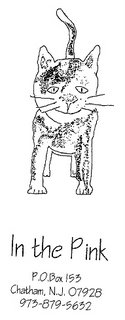TTAB Affirms 2(d) Refusal of "IN THE PINK," Finding Handbags and Clothing Store Services Related
The PTO's third-party registration evidence proved fatal to Applicant Gordon C. Russell's attempt to register the mark IN THE PINK for retail store services featuring various clothing items. The Board affirmed a Section 2(d) refusal, finding the mark likely to cause confusion with the identical mark registered for handbags. In re Russell, Serial No. 78170148 (May 30, 2006) [not citable].

Examining Attorney April Rademacher submitted several use-based third-party registrations for marks covering both handbags and retail clothing store services, along with screenshots from on-line retail websites offering clothing and handbags.
Applicant argued that "in today's marketplace, the reality is virtually any two goods and/or services may originate from the same source." The Board noted that, in fact, third-party registrations submitted by applicant covered handbags and a wide range of products and services, "some of which, admittedly, are not commercially related to handbags," and it agreed with Applicant that "the mere fact that any two goods and/or services are listed in a registration does not necessarily mean that they are related." However, here there is a "relatedness between handbags and clothing, as well as between handbags and retail clothing store services, that may not exist with some of the other items covered in these registrations." The Board therefore ruled that "there is a viable relationship between retail clothing store services and handbags."

As to the mark IN THE PINK, Applicant contended that the phrase is a "popular and widely used figure of speech," but the Board pointed out that the phrase is nonetheless arbitrary for the involved goods and services. Finally, Applicant submitted six third-party registrations of IN THE PINK for various goods and services, but the Board found that evidence of little probative value: first, the registrations are not evidence of use of the mark or of the public's familiarity therewith; and second, the registrations cover goods or services not even remotely related to handbags or retail clothing store services.
The Board therefore concluded that confusion is likely, and it affirmed the refusal to register.
TTABlog comment: This case illustrates once again the different treatment accorded third-party registrations when submitted by the PTO and when submitted by an Applicant. In the context of proving the relatedness of goods/services, the Examining Attorney need not establish that the marks of the proffered third-party registrations are in use or that the public is familiar with them. When an applicant submits third-party registrations to prove that confusion is not likely, however, the evidence is dismissed unless proof of use and familiarity is submitted. Is it surprising, then, that 80% or more of 2(d) refusals are affirmed on appeal?
In this Internet age, shouldn't the PTO be required to show that the marks of the cited registrations are in use? Does the argument that the PTO has limited resources for investigation hold water any more, when searches can be conducted on the Internet at minimal cost?
Text Copyright John L. Welch 2006.




0 Comments:
Post a Comment
<< Home